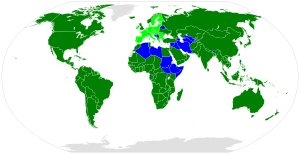Economic law facts for kids
Economic law is like a set of rules that help manage how money, goods, and services work in a country. It's all about how things are made, shared, and used. Every country has its own special rules to make sure its economy runs smoothly. These rules help decide how businesses operate, how wealth is shared, and who owns important resources.
Economic Law: Rules for Business and Money
Economic law helps decide how things are made and given out in a country. Different countries have different ways of managing their money and businesses. These ways are called economic systems. Each system has its own ideas about how laws should work. They decide who owns things, how wealth is shared, and what different groups in the economy are responsible for. Some main economic systems are the market system (called capitalism), the command system (called socialism), and traditional systems.
How Different Countries Manage Their Economies
Capitalism: The Market System
Capitalism is an economic system where most businesses and property are owned by private people or companies, not the government. The main goal is to make products and services to sell them in a market.
In capitalism, the government's main job is to create a good environment for businesses to operate freely. This includes making sure private ownership is protected. The exact rules for this can be different in various countries.
There are different types of capitalism. For example, some countries have "liberal market economies" (LMEs). Here, economic laws try to keep government involvement in businesses very low. This means fewer rules for companies, encouraging private ownership, and laws to stop big companies from becoming monopolies. They also offer tax breaks to help businesses grow and make more money.
Other countries have "coordinated market economies" (CMEs). These systems focus more on teamwork between different groups, like businesses, workers, and the government. Laws here often encourage sharing information and working together instead of just competing.
Socialism: The Command System
Socialism is an idea where the main goal is for the public to own the ways things are made. This often means the government owns businesses and resources. The idea is that the government will act for everyone's benefit and share resources fairly.
Laws in a socialist economy aim for everyone to be more equal. In capitalist countries, profits usually go to business owners. But in socialist economics, the main purpose of making things is to meet what people need. Any profits are seen as shared benefits for everyone.
Rules for Businesses and Competition
Competition laws, also known as antitrust laws, are rules that stop one company from becoming too powerful in an industry. They control things like when companies join together (mergers) or when they try to trick customers. These laws prevent companies from becoming the only provider of a product or service, which could create unfair barriers for new businesses.
Governments use these laws to encourage different kinds of competition.
- Monopolistic competition means many smaller businesses compete in the same industry. Countries that like this often have strict antitrust laws. This gives customers many different choices for products and services. These companies usually don't have much power to set prices.
- Oligopolies are when only a few large companies control an industry. Laws for oligopolies are less strict. These big companies have a lot of power in the market. It's hard for new businesses to enter these markets. Sometimes, these big companies might even work together to set prices or influence laws.
Economic Rules Between Countries
International economic law deals with how countries do business with each other. It covers things like trade, investments, money, and intellectual property rights (like patents and copyrights) across borders.
Many groups help manage these international economic laws. These include:
- The World Trade Organisation (WTO)
- The International Monetary Fund (IMF)
- The United Nations
- The Organisation for Economic Cooperation and Development
- The World Bank
There are also groups that work on a smaller, regional scale, like the Association of Southeast Asian Nations (ASEAN) and the European Union.
What Are International Economic Organizations?
International economic organizations are like meeting places for many countries. They help countries with different economic rules work together when they do business across borders.
The World Trade Organization (WTO)
The World Trade Organisation (WTO) is a group that sets the rules for international trade. It helps countries trade goods, services, and intellectual property. These rules are decided when trading countries talk and agree on terms. The WTO's goal is to make trade easier, lower barriers between countries, and create a fair trading system that helps everyone. The WTO also helped create the "TRIPS Agreement", which sets rules for intellectual property around the world.
The International Monetary Fund (IMF)
The International Monetary Fund (IMF) has 190 member countries. It helps make sure the world's money system is stable and balanced. The IMF works to keep exchange rates steady and encourages international trade. It also helps countries that need money for a short time. When countries borrow from the IMF, they often agree to make certain changes to their economic policies. The IMF's rules for lending often reflect the interests of the countries that have the most influence in the fund.
See also
 In Spanish: Derecho económico para niños
In Spanish: Derecho económico para niños
- Constitutional economics
- Law and economics
- Political economy


